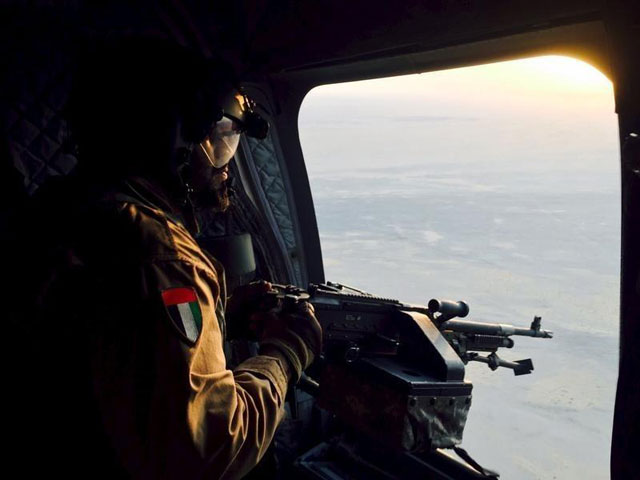
As thousands of coalition soldiers fight daily battles with the Houthis on the front lines, their comrades in Aden are training Yemeni troops and trying to rebuild a functioning state loyal to President Abd-Rabbu Mansour Hadi.
Al Qaeda militants take over two south Yemen towns, residents say
Infighting within the Hadi camp, the martial prowess of the Houthis and a growing Islamist menace have given the UAE armed forces, which have deployed in international operations from Kosovo to Afghanistan, their biggest challenge yet.
Saudi Arabia assembled the coalition in March to carry out air strikes against the Houthis, whose rapid advance through the country had forced Hadi into exile in Riyadh and sparked fears of Iranian influence on the Arabian Peninsula.
Since then, the coalition has ramped up its deployment of ground forces and the UAE, which has contributed the largest and most experienced contingent of ground troops, has taken an increasingly prominent role.
Brigadier Nasser Mushabab Al Otaibi, the Emirati officer leading the combined land force, said around 4,000 troops from the UAE, Saudi Arabia, Bahrain and Sudan were now in Yemen, in the first major Gulf Arab-led intervention. He declined to say how many were from the UAE.
As well as fighting on the front lines, coalition soldiers are training around 7,000 Yemeni troops, and plan to begin building a police force in Aden to replace the ragtag local militias who currently man the checkpoints.
"They have their own army, they are trying to build police, and they have a government in Aden... it's a country now," Otaibi said in an interview at the UAE's military headquarters in the once-thriving port city.
Nonetheless, progress on the ground has been slow since the coalition took Aden in July. The Houthis and their allies still control most populated areas including the capital Sanaa, and are putting up a tough fight in the important city of Taiz, 180km (110 miles) north-west of Aden.
"They are very good snipers. They've been using guns since they were this big," said one soldier of the Houthis, holding his hand out at waist height.
Understanding Yemen conflict: ‘Destruction of a world heritage site may trigger reaction from public’
Otaibi said it would take another month or two for the coalition to capture Taiz. After that, with a United Nations-backed peace process barely out of the starting blocks, more battles will surely lie ahead.
Building a nation
In the absence of a quick military victory, the UAE has poured money into reconstruction and humanitarian aid in Aden, hoping to build a sustainable economy and set an example of good governance that will turn public opinion against the Houthis.
A team from the UAE's Red Crescent Society said it had spent almost $100 million on power stations alone, and distributed food to 163,000 families.
"If you walk down the street you will see electricity everywhere, water supply, prices going down," Otaibi said. He said in Aden the price of flour, the staple food, was less than one sixth what it was in Sanaa.
Hadi returned from exile last month, pledging to oversee the reconquest of Taiz and making Aden a de facto capital city for the first time since 1990, when the People's Democratic Republic of Yemen (PDRY or South Yemen) unified with the north.
Separatist sentiment, suppressed after a failed uprising in 1994, is once again on the rise. The PDRY flag, sporting a socialist star on Arab nationalist colors, is proudly hoisted alongside the UAE and Saudi colors at militia checkpoints around the city; the Yemeni flag is nowhere to be seen.
The resurgence of separatism suggests that not everyone in Aden shares Hadi's goal of reunifying Yemen. Local fighters who helped drive the Houthis from Aden may not have the appetite to chase them all the way back to Sanaa.
Even within the Hadi establishment, there are signs of a growing rift between the president, who is pushing for total victory to bolster his legitimacy, and Vice President Khaled Bahah, whom diplomats see as more amenable to peace talks.
On Tuesday, Bahah rejected a cabinet reshuffle ordered by Hadi, signaling a deepening rift between the two leaders.
America's only Muslim-majority city welcomes Syrian refugees
And at some point, the coalition will need to turn its attention to the sparsely populated east, where Islamic State and al Qaeda are seizing territory and menacing Aden's flank. Al Qaeda took over two towns around 50 km (30 miles) from Aden on Wednesday, residents said.
'The right mission'
UAE troops flying home said they would be back in Yemen after a short break. With its air-conditioned tents and satellite television, the base in Aden has become a second home for many of them.
On the UAE home front, cars carry stickers supporting the troops and cinemas show elegies to the fallen soldiers, proclaiming that "Your sacrifice protects the nation". Newspapers are filled with dispatches from the front.
On Monday, there were public commemorations for "Martyr's Day", a new public holiday introduced after 45 Emirati soldiers were killed in a single incident.
Nonetheless, there are no signs of war weariness among the Emirati troops, who see the Yemen campaign as a war of necessity despite its remoteness. The fighting is taking place more than 1,000 km (600 miles) from the UAE's borders.
"We have a mission and we believe it's the right mission ... we know if we don't do this fight this time, we'll do it in five or ten years and it will be harder than now," Otaibi said.
1731907834-0/Jonathan-Majors-and-Meagan-Good-(2)1731907834-0-405x300.webp)
1731906859-0/Jonathan-Majors-and-Meagan-Good-(1)1731906859-0-165x106.webp)

1724657897-0/Untitled-design-(2)1724657897-0-165x106.webp)













COMMENTS (1)
Comments are moderated and generally will be posted if they are on-topic and not abusive.
For more information, please see our Comments FAQ